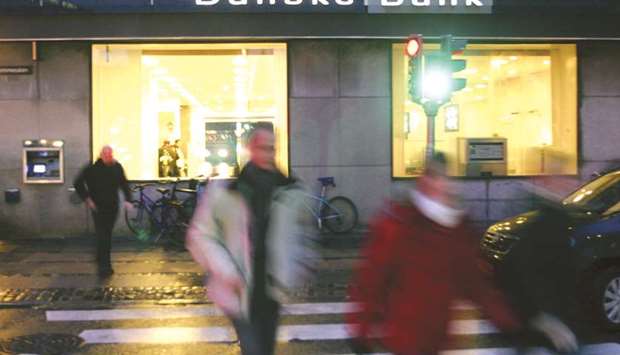Danske Bank has admitted that about $234bn flowed through a tiny unit in Estonia between 2007 and 2015, and is treating a “large” share of that amount as “suspicious” transactions. Chief executive officer Thomas Borgen has resigned and several employees have been reported to the police. Criminal investigations are ongoing and the government says Danske may face a $630mn fine.
S&P Global Ratings says the sheer scale of the scandal has put the Danish government’s AAA credit grade at risk. S&P first made the comment in a September 14 note, and said the view still holds, when contacted by phone on September 20. It’s a warning that has Danish politicians worried, and on Wednesday parliament quickly agreed on a package of much stricter laws to fight money laundering.
Rasmus Jarlov, Denmark’s business minister and the man who oversees financial legislation in the country, says S&P’s assessment makes clear the government needs to act. In an interview, he said previous signals from the administration that bank regulations might be softened are now going nowhere.
“I don’t have any intention to lower capital requirements,” he said.
The Danske Bank scandal “is hurting the Danish financial sector’s reputation, which makes it urgent that we respond and draw up some consequences for everybody to see that we’re treating this with the utmost seriousness.”
The spectre of a sovereign ratings downgrade hung over lawmakers’ heads on September 19 as they agreed on measures that include raising bank fines by 700%. Prime Minister Lars Lokke Rasmussen said the same day that the Danske case is far from over. It “doesn’t end here,” he said.
The sense of shock throughout Denmark’s political establishment was palpable as lawmakers across party lines expressed dismay and underscored the need to take a tough stance. The laundromat case has unsettled a country generally associated with some of the world’s lowest levels of corruption and highest levels of transparency. It’s also left the European Union wondering what went wrong.
EU Justice Commissioner Vera Jourova called the scandal “shocking,” and said she’s planning to meet with the finance minister of Denmark, among others, on October 2 to discuss the case.
“This is absolutely the biggest scandal which we have now in Europe,” she said.
Morten Bodskov, a former justice minister who is now a member of the opposition, compared the Danske laundering scandal to the fallout of the 2008 financial crisis in Denmark. Now, as was the case then, it’s “a question of defending our AAA rating,” he said. “If we can’t do that, then we’re in serious trouble.”
“It’s crucial that we act fast,” said Morten Ostergaard, leader of the opposition Social Liberals. “Hopefully that’s the answer we need to give to the people assessing our credit rating.” When it comes to Denmark’s reputation in general, that will take “longer to rebuild,” he said.
Lisbeth Bech Poulsen, a spokeswoman for the opposition Socialist People’s Party, said, “The fact that S&P says it may lower our national rating because of this, and the instability that would cause in the financial system and the general economy, prompts us to have some very serious thoughts about what kind of financial supermarkets we should have.”

